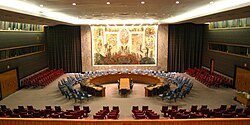
Back Groot moondheid AF Großmacht ALS قوة عالمية Arabic Böyük güc AZ Вялікія дзяржавы BE Велика сила Bulgarian মহা শক্তি Bengali/Bangla Potència mundial Catalan زلھێز CKB Velmoc Czech

| Part of the Politics series |
| Basic forms of government |
|---|
| List of countries by system of government |
|
|
A great power is a sovereign state that is recognized as having the ability and expertise to exert its influence on a global scale. Great powers characteristically possess military and economic strength, as well as diplomatic and soft power influence, which may cause middle or small powers to consider the great powers' opinions before taking actions of their own. International relations theorists have posited that great power status can be characterized into power capabilities, spatial aspects, and status dimensions.[2]
While some nations are widely considered to be great powers, there is considerable debate on the exact criteria of great power status. Historically, the status of great powers has been formally recognized in organizations such as the Congress of Vienna of 1814–1815[1][3][4] or the United Nations Security Council, of which permanent members are: China, France, Russia, the United Kingdom, and the United States.[1][5][6] The United Nations Security Council, NATO Quint, the G7, the BRICS, and the Contact Group have all been described as great power concerts.[7][8]
The term "great power" was first used to represent the most important powers in Europe during the post-Napoleonic era. The "Great Powers" constituted the "Concert of Europe" and claimed the right to joint enforcement of the postwar treaties.[9] The formalization of the division between small powers[10] and great powers came about with the signing of the Treaty of Chaumont in 1814. Since then, the international balance of power has shifted numerous times, most dramatically during World War I and World War II. In literature, alternative terms for great power are often world power[11] or major power.[12]
- ^ a b c Peter Howard (2008). "Great Powers". Encarta. MSN. Archived from the original on 31 October 2009. Retrieved 20 December 2008.
- ^ Iver B. Neumann, "Russia as a great power, 1815–2007." Journal of International Relations and Development 11.2 (2008): 128–151. online
- ^ Fueter, Eduard (1922). World history, 1815–1930. United States: Harcourt, Brace and Company. pp. 25–28, 36–44. ISBN 1-58477-077-5.
- ^ Danilovic, Vesna. "When the Stakes Are High – Deterrence and Conflict among Major Powers", University of Michigan Press (2002), pp 27, 225–228 (PDF chapter downloads) Archived 30 August 2006 at the Wayback Machine (PDF copy) .
- ^ Louden, Robert (2007). The world we want. United States of America: Oxford University Press US. p. 187. ISBN 978-0195321371.
- ^ T. V. Paul; James J. Wirtz; Michel Fortmann (2005). "Great+power"&pg=PA59 Balance of Power. United States: State University of New York Press, 2005. pp. 59, 282. ISBN 0791464016. Accordingly, the great powers after the Cold War are Britain, China, France, Germany, Japan, Russia and the United States p. 59
- ^ Gaskarth, Jamie (11 February 2015). Rising Powers, Global Governance and Global Ethics. Routledge. p. 182. ISBN 978-1317575115.
- ^ Richard Gowan; Bruce D. Jones; Shepard Forman, eds. (2010). Cooperating for peace and security: evolving institutions and arrangements in a context of changing U.S. security policy (1. publ. ed.). Cambridge [U.K.]: Cambridge University Press. p. 236. ISBN 978-0521889476.
- ^ Charles Webster, (ed), British Diplomacy 1813–1815: Selected Documents Dealing with the Reconciliation of Europe, (1931), p. 307.
- ^ Toje, A. (2010). The European Union as a small power: After the post-Cold War. New York: Palgrave Macmillan.
- ^ "World power Definition & Meaning | Dictionary.com".
- ^ "Dictionary – Major power". reference.com.